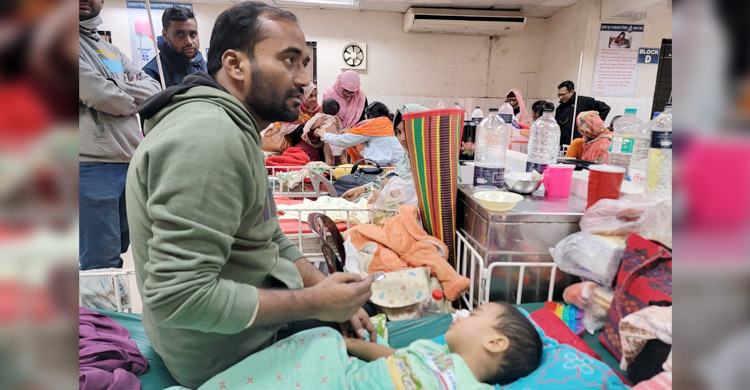icddr,b grapples with winter diarrhoea cases, 80% children

As winter sets in, the number of diarrhoea cases in Dhaka has surged, particularly among children.
The International Centre for Diarrhoeal Disease Research, Bangladesh (icddr,b) is grappling with an influx of 600–700 patients daily, with children accounting for 80% of the cases.
The situation has forced the hospital to treat patients in tents erected outside its main facility in Mohakhali.
Overwhelmed facilities
Upon visiting icddr,b, a large tent was observed at the main gate to accommodate the overflow of patients. Inside, emergency wards and outpatient departments (OPD) are packed with children and adults receiving treatment, mainly saline.
Parents from across the country, like Keraniganj and Jamalpur, are rushing their children to the hospital after local treatments failed.
Spike in patient numbers
Hospital data reveals a staggering rise in diarrhoea cases:
January 4: 267 patients by noon.
January 3: 648 patients.
January 1: 850 patients.
In December 2024, daily admissions averaged 850–900, significantly straining hospital resources.
Rotavirus: A leading cause
Dr Lubaba Shahrin, a scientist at icddr,b, said, “Most winter diarrhoea cases are caused by rotavirus, a common viral infection in children under five. About 40–50% of current cases are linked to this virus.” She noted an unusual increase in cases this year, with 800–900 patients treated weekly over the past two months.
Warning signs for hospitalisation
Dr Shahrin advised parents to watch for alarming symptoms, including:
Excessive vomiting (more than three times an hour).
High fever or behavioral changes.
Blood in stools.
Inability to eat or drink.
She emphasised that such signs necessitate immediate hospital care.
Prevention and treatment
Dr Shahrin highlighted preventive measures:
Vaccination: Rotavirus vaccines for infants aged three months and older.
Hygiene: Clean drinking water, hygienic food, and handwashing with soap after defecation and before meals.
She also clarified that antibiotics are unnecessary for rotavirus diarrhoea. “Hydration through saline and zinc supplements is sufficient. Recovery typically occurs within 5–7 days,” she added.
Importance of proper saline use
Saline preparation and dosage must be age- and weight-appropriate to avoid complications like hyponatremia, which can lead to seizures or fainting.
Dr Shahrin stressed following instructions carefully, ensuring adequate hydration without over- or under-dosing.
Government and local response
The hospital is working tirelessly to manage the influx, with adequate medicine stocks and specialized care. Health officials are urging parents to remain vigilant and seek early treatment to avoid severe complications.

